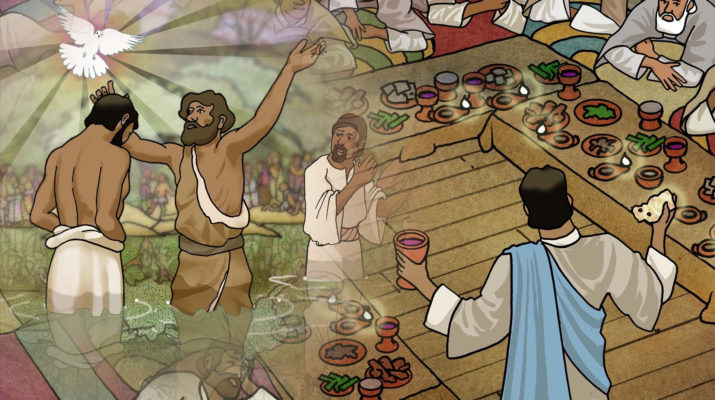John 6:51-58
Ordinary B38
51 I am the livingA breadB that came downC from heaven.D
A “living” = zao. This is to live literally or figuratively. It is used for life including the vitality of humans, plants, and animals – it is life physical and spiritual and life everlasting.
B “bread” = artos. Perhaps from airo (raise, take up, lift, remove). This is bread or a loaf. It is a loaf as raised.
C “came down” = katabaino. From kata (down, against, throughout, among) + baino (to walk, go). This is to come down whether from the sky to the ground or from higher ground to lower. It can be used in a literal or figurative sense.
D “heaven” = ouranos. May be related to oros (mountain, hill) with the notion of height. This is the air, the sky, the atmosphere, and heaven. It is the sky that is visible and the spiritual heaven where God dwells. Heaven implies happiness, power, and eternity.
Whoever eatsE of this bread will live forever;F and the bread that I will giveG for the lifeH of the worldI is my flesh.”J
E “eats” = phago. This is to eat or figuratively to consume like rust does.
F “forever” = eis + ho + aion. Literally, “to the age.” Aion is from the same as aei (ever, always, unceasingly, perpetually; on every occasion). This is an age, cycle of time, course, continued duration. It is also used to describe the eternal or forever. This is the word used to discuss the present age or the messianic age.
G “give” = didomi. To give, offer, place, bestow, deliver. This is give in a literal or figurative sense.
H “life” = zoe. Related to “living” in v51. From zao (see note A above). This is life including the vitality of humans, plants, and animals – it is life physical and spiritual and life everlasting.
I “world” = kosmos. Perhaps from the base of komizo (to carry, convey, recover); from komeo (to take care of). This is order, the world, the universe, including its inhabitants. Literally, this is something that is ordered so it can refer to all creation. It can also refer to decoration in the sense that something is better ordered and, thus, made more beautiful. This is where “cosmos” and “cosmetics” come from.
J “flesh” = sarx. May be from saroo (to sweep, cleanse by sweeping); from sairo (to brush off). This is flesh, the body, human nature, materiality, kindred. Flesh is not always evil in scripture (as when it refers to Jesus taking on a human body). However, it is generally used in a negative way for actions made selfishly and not through faith. This can mean animal flesh, i.e. meat, or refer to body in contrast to soul/spirit. Flesh can be a way of talking about how things or people are related or talking about human frailty (physical or moral).
52 The JewsK then disputedL among themselves, saying, “How canM this man give us his flesh to eat?”
K “Jews” = Ioudaios. From Ioudas (Judah, Juadas); from Hebrew Yehudah (Judah, son of Jacob, his tribal descendants, a name for the southern kingdom. Literally, it means praised); probably from yadah (to throw one’s hands into the air in a gesture of praise); from yad (hand). This is Jewish, a Jew, or Judea.
L “disputed” = machomai. 4x in NT. This is to fight, strive, dispute, quarrel, to war.
M “can” = dunamai. This is to be able, or something that is possible. It can also be empowered or being powerful. The Greek word for “miracle” (dunamis) comes from this root.
53 So JesusN said to them, “Very truly,O I tell you, unless you eat the flesh of the SonP of ManQ and drinkR his blood,S you have no life in you.
N “Jesus” = Iesous. From Hebrew Yehoshua (Joshua, the Lord is salvation); {from YHVH (proper name of the God of Israel; the self-existent and eternal one); {from havah (to become) or from hayah (to come to pass, become, be)} + yasha (to deliver, defend, help, preserve, rescue; properly, to be open, wide or free, which implies being safe. So, in a causative sense, this is to free someone)}. This is Jesus or Joshua in Greek – the Lord saves or the Lord is salvation.
O “very truly” = amen + amen. From Hebrew amen (verily, truly, amen, truth, so be it, faithfulness); from aman (to believe, endure, fulfill, confirm, support, be faithful, put one’s trust in, be steadfast. Figuratively, this is to be firm, steadfast, or faithful, trusting, believing, being permanent, morally solid). This word is literally firmness, but figuratively fidelity, faithfulness, honesty, responsibility, trust, truth, steadfastness. Properly, it is to be sure, certain, or firm. This is a word of emphasis indicating that something crucial follows.
P “Son” = Huios. This is son, descendant – a son whether natural born or adopted. It can be used figuratively for other forms of kinship.
Q “Man” = anthropos. Probably from aner (man, male, husband) + ops (eye, face). This is human, humankind. Used for all genders.
R “drink” = pino. This is to drink, literally or figuratively.
S “blood” = haima. This is blood in a literal sense as bloodshed. Figuratively, it can also be used to refer to wine or to kinship (being related).
54 Those who eatT my flesh and drink my blood have eternalU life, and I will raise them upV on the lastW day;
T “eat” = trogo. 6x in NT. This is gnaw, crunch, eat, eat a meal.
U “eternal” = aionios. Related to “forever” in v51. From aion (see note F above). This is age-long, forever, everlasting. Properly, that which lasts for an age. This is where eon comes from.
V “raise…up” = anistemi. From ana (upwards, up, again, back, anew) + histemi (to make to stand, place, set up, establish, appoint, stand by, stand still, stand ready, stand firm, be steadfast). This is to raise up, rise, appear. It is to stand up literally or figuratively. Can also mean to resurrect.
W “last” = eschatos. Related to eschaton (end, last); perhaps from echo (to have, possess, hold). This is last, end, extreme, final. It is often used to discuss the end times, prophecies of the future, and the afterlife. The branch of theology focusing on all these topics is called “eschatology.”
55 for my flesh is trueX foodY and my blood is true drink.Z
X “true” = alethes. From a (not) + lanthano (concealed, hidden, unnoticed; to shut one’s eyes to, unwittingly, unawares). This is true, unconcealed; true because it is in concert with fact and reality – attested. Literally, what cannot be hidden; truth stands up to test and scrutiny and is undeniable, authentic.
Y “food” = brosis. 11x in NT. From bibrosko (to eat). This is food and the act of eating. It is eating in a literal or figurative sense.
Z “drink” = posis. Related to “drink” in v53. 3x in NT. From pino (see note R above). This is a drink, whether the action of taking a drink or the drink itself.
56 Those who eatAA my flesh and drinkBB my blood abideCC in me, and I in them.
AA “eat” = trogo. Same as “eat” in v54. See note T above.
BB “drink” = pino. Same as “drink” in v53. Se note R above.
CC “abide” = meno. This is to stay, remain, wait, await, continue, abide, endure. It can mean to literally stay in a place or to remain in a condition or to continue with hope and expectation.
57 Just as the living FatherDD sentEE me, and I live because of the Father, so whoever eatsFF me will live because of me.
DD “Father” = Pater. This is father in a literal or figurative sense. Could be elder, senior, ancestor, originator, or patriarch.
EE “sent” = apostello. Related to “raise…up” in v54. From apo (from, away from) + stello (to send, set, arrange, prepare, gather up); {probably from histemi (see note V above)}. This is to send forth, send away, dismiss, send as a messenger. It implies one that is sent for a particular mission or purpose rather than a quick errand. This is where “apostle” comes from.
FF “eats” = trogo. Same as “eat” in v54. See note T above.
58 This is the bread that came down from heaven, not like that which your ancestorsGG ate,HH and they died.II But the one who eatsJJ this bread will live forever.”
GG “ancestors” = pater. Same as “Father” in v57. See note DD above.
HH “ate” = phago. Same as “eats” in v51. See note E above.
II “died” = apothnesko. From apo (from, away from) + thnesko (to die, be dead). This is to die off. It is death with an emphasis on the way that death separates. It can also mean to wither or decay.
JJ “eats” = trogo. Same as “eat” in v54. See note T above.
Image credit: “Remembering Jesus with Communion” by John Paul Stanley of YoMinistry.




